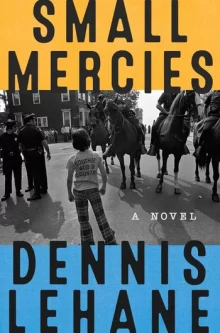By Denise Petski
May 26th, 2022
Ray Liotta had recently wrapped shooting Apple’s upcoming series Black Bird, his final completed television series, shortly before his death. In a heartfelt remembrance Thursday, series creator Dennis Lehane fondly remembered Liotta as “the most electric American actor of his generation.” Lehane revealed that it “was the culmination of a lifelong dream” to work with Liotta and that he wrote the role of Big Jim Keene specifically for the Emmy-winning actor, describing his performance as a “master class.” Lehane also shares their funny and poignant interactions on set. You can read his entire tribute below.
The upcoming limited series, set for premiere July 8 on Apple TV+, marked Liotta’s return to series television as a lead opposite Taron Egerton and Paul Walter Hauser. An adaptation of James Keene and Hillel Levin’s true-crime memoir, In With The Devil: A Fallen Hero, A Serial Killer, and A Dangerous Bargain for Redemption, the six-episode psychological thriller is developed and produced by Lehane.
Liotta’s Big Jim Keene is a popular former ranking officer in the Kankakee police and fire departments who had influential friends in the highest reaches of state and local government.
The logline: Inspired by actual events, when high school football hero, decorated policeman’s son, and convicted drug dealer Jimmy Keene (Taron Egerton) is sentenced to 10 years in a minimum security prison, he is given the choice of a lifetime — enter a maximum-security prison for the criminally insane and befriend suspected serial killer Larry Hall (Paul Walter Hauser), or stay where he is and serve his full sentence with no possibility of parole. Keene quickly realizes his only way out is to elicit a confession and find out where the bodies of several young girls are buried before Hall’s appeal goes through. But is this suspected killer telling the truth? Or is it just another tale from a serial liar? This dramatic and captivating story subverts the crime genre by enlisting the help of the very people put behind bars to solve its mysteries.
Sepideh Moafi and Greg Kinnear also star.
Black Bird is developed and executive produced by Lehane. The first three episodes are directed by Michaël R. Roskam, who also serves as executive producer. Lehane, Egerton and Roskam executive produce alongside Richard Plepler through his Eden Productions; Bradley Thomas, Dan Friedkin and Ryan Friedkin executive produce through Imperative Entertainment; Alexandra Milchan and Scott Lambert executive produce through Emjag Productions; and Kary Antholis also executive produces, along with the book’s author James Keene. Jim McKay and Joe Chappelle also direct. The limited series is produced for Apple TV+ by Apple Studios.
Lehane’s tribute:
“It was, quite literally, the culmination of a lifelong dream to work with Ray Liotta. From the moment I saw him blow out the screen, his co-stars, and the back of the theater in SOMETHING WILD, I found him the most electric American actor of his generation. At the heart of a Ray Liotta performance was a duality that he couldn’t quite control; I suspect it wasn’t conscious. It felt, instead, like something that was locked in his DNA. When his character was threatening and dangerous, he still couldn’t fully hide the sweet little boy inside. When the character was charming, even loving, you could still feel something volatile roiling underneath.
I wrote the part of Big Jim Keene in BLACK BIRD for Ray. I had no other actor in mind and was floored—humbled, honored, fist-pump elated—when he leapt at playing the part less than 24 hours after we sent him the scripts. And the performance he gave? It was a master class. He wholly embodied a man who realizes that his lifetime of cutting corners and flitting along the edges of corruption have hung an albatross of very bleak options around the neck of his own son. But as deeply flawed and compromised as the character is, Ray found the nobility in a man who would run into a burning building for that same son and never break his stride. It was that duality I counted on to carry the emotional heart of our show from beginning to end.
Ray came to set to work. He expected those he worked with to be prepared, professional, and to take their work as seriously as he did. I loved that about him. One day, we’re shooting a diner scene where Big Jim has a stroke. And the scene is taking a while to light and set up and several other conditions are in play that are less than ideal. And Ray’s getting more and more pissed off.
Eventually, I get a call from my assistant: “Ray needs you NOW.”
I get over there and Ray’s standing in the doorway of the diner, agitated. He steps up close to me—the whole crew is holding its breath by this time, everyone on eggshells—and Ray says, “What does ruefully mean?”
I say, “What?”
He says, “In the script. It says I smile ruefully.”
I give it a thought and say, “It means with `ironic or mild regret.’”
And Ray quotes Webster’s to me. “No, no. The definition of ruefully is `pitiable, mournful, regretful.’ There’s nothing MILD about that, Dennis.”
I say, “You’re right.”
And he says, “So why did you write it?”
150 people have stopped working to hear my answer.
So, I say, “I don’t know, Ray, it was like nine months ago. Forget ruefully. How do you feel in the scene?”
He says, “I feel slightly irritated.”
I say, “Okay then. Play that.”
He says, “Thank you.” Starts to walk off.
Everyone’s still staring at me. So, I call after Ray, “I tell you one thing, Ray—I rue the day I wrote that fucking line.” The whole crew looks like they all swallowed a puppy at the same time.
Ray looks back over his shoulder at me with pure menace. And then…
He laughs. Big loud, Ray Liotta guffaw. And everyone breathes again. And laughs with him. And then we all go back to work.
I’ll cherish that memory for the rest of my life. And I will always rue the day he left us.”


